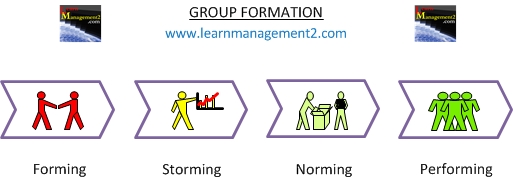Group Formation Theory
Introduction
This group formation theory is the brainchild of Bruce Tuckman. Tuckman suggested that for a group to develop into a successful team, it will need to progress through four stages: Forming, Storming, Norming and Performing.
The diagram below illustrates the four stages in Bruce Tuckman's Group Formation Theory
Forming
This stage is about the team forming:
- Team meets for the first time.
- The team tries to agree goals and objectives.
- The leader must coach at this time.
- Leader must try and establish team cohesion.
Storming
Once a team has completed the forming stage they will move onto storming
- Team brainstorms their purpose and what tasks needs to be addressed.
- Team members try to establish their roles within the group.
- Team members may also develop personal friendship.
- Leader still coaches at this stage.
Norming
During this stage team members are becoming accustomed to working with each other
- Reaching this stage may take a while depending on team dynamics and formation.
- Team members start to work fluently.
- They start to support each other.
- They agree on team value and rules and go with team consensus.
- There is improved motivation and the team may go on social events.
Performing
At this stage the team are now on the path to becoming a team that will work's together successfully.
- If the team is effective and reach this stage they'll get the job done.
- The task is completed without the guidance of the manager.
- The team can work independently and efficiently.
- Any disagreements are resolved within the team.
Conclusion
Forming, norming, storming and performing by Bruce Tuckman is a popular group formation theory. It is particularly useful for managers taking over a new team or for managers keen to overcome poor performance. The first step for team managers is to identify the stage their team is at, so that they can formulate a plan to move the team onto next stage. As a team progresses through each stage the manager's involvement reduces. At the forming stage a team requires lots of direction and instructions from their manager, whilst a performing team will only need management support on the rare occasion.
